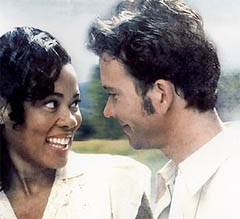|
Intermix.org.uk is a website for the benefit
of mixed-race families, individuals and anyone who feels they have a multiracial
identity and want to join us. Our mission is to offer a view of the mixed-race experience, highlighting icons, film, books, poetry, parenting techniques, celebrities, real lives and much more. Our online forums are a great place to meet others, ask questions, voice your opinions and keep in touch. Sign up for our monthly newsletter and delve into our pages. Want to join in? Become an Intermix member to take part: |
Loving V Virginia - The Legal Fight To Be Together
 Although
it may be sometimes difficult being in a relationship with someone
from another race it is a lot easier than it used to be, especially
in the united States.
Although
it may be sometimes difficult being in a relationship with someone
from another race it is a lot easier than it used to be, especially
in the united States.
It used to be illegal for anyone in
the U.S. to marry someone from another race, especially from the black
race. In some states the punishment was imprisonment but in others, citizens
took matters into their own hands and lynching was the preferred treatment.
Today there are still some areas of the U.S. where mixed-race marriages
are frowned upon but thanks to the case of Loving
v Virginia it is no
longer illegal in America to marry someone from another race.
Mildred Jeter and Richard Loving grew up in Caroline County, Virginia.
They fell in love and decided to get married. Unfortunately, getting married
was not as simple in 1958 as it was today. Mildred was black and Richard
was white. There were laws that forbade people of different races to marry
each other. This was true in many states, including Mildred and Richard's
home state of Virginia. However, interracial marriage was legal in Washington,
DC at that time. Therefore, they decided to drive to DC, get married, and
return to Virginia to begin their life together.
This proved to be a short term solution. The law in Virginia not only
forbade interracial marriage ceremonies, but it also forbade interracial
couples from getting married elsewhere and returning to Virginia. One
night, while they were asleep, the newly-married Lovings were awakened
by the police in their bedroom. The Lovings were taken to jail for the
crime of being married.
When they went to trial, the judge found them guilty and sentenced them to a jail term of one to three years. However, the judge told the Lovings that he would suspend the sentence if they agreed to leave Virginia for a period of twenty five years. Given the choice between imprisonment and banishment, they chose banishment. The Lovings moved to Washington, DC.
The Lovings were able to live together legally in
Washington, but they did not have an easy time. They faced discrimination
everywhere. They were not able to rent property in most parts of the
city, and they were often the target of racist taunting. Also, they were
facing the emotional hardship of separation from their families. Life
was both difficult and unpleasant for the Lovings in Washington. They
were having difficulty supporting their children. In desperation, Mildred
sent a letter to Robert F. Kennedy, Attorney General of the United States.
Mildred's letter was forwarded from the Attorney General's office to the offices
of the ACLU (American Civil Liberties Union) in New York. They took interest
in the Loving's case and contacted a lawyer named Bernard S. Cohen. Mr. Cohen
also felt that the Lovings were entitled to be married and to live in the state
of their choice. He agreed to work on the Loving's case for free.
Their case went through many levels of the justice system and their appeal
was denied every time. Eventually their case appeared before the United States
Supreme Court. The Court decided unanimously in their favor. Finally, after
nine years of struggle, the Loving won the right to live together as husband
and wife in their home state. In the words of Chief Justice Earl Warren, 'Under
our Constitution, the freedom to marry, or not marry, a person of another race
resides within the individual and cannot be infringed on by the State.'
The Loving's case not only won them their freedom to love, but it also granted
the same freedom to every interracial couple in every state in America. At
the time of the Loving decision, sixteen states from Delaware to Texas had
laws banning interracial couples. Loving v. Virginia (1967) made it
illegal for these states to enforce those laws. This ended a long era of laws
that were enforced in forty-two states over the course of American history.
These laws did not only apply to black people and white people; many states
also restricted relationships with Asians, Native Americans, Indians, Hispanics,
and other ethnic groups.
In 1996 the story of the Loving's battle against the state of Virginia was
made into the film Mr
& Mrs Loving,
starring Lela Rochon and Timothy Hutton .
In the U.S. Loving Day, June 12 is a time for celebration and this year is
the 39th anniversary of Loving v. Virginia, the Supreme
Court decision that legalized the marriage of interracial couples throughout
America. Click here to go to the Loving.org website
and see how you can join in the celebrations.
Source:www.loving.org
:
